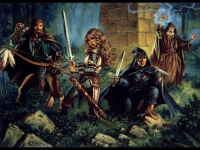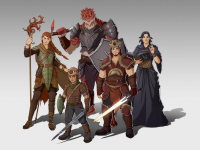I think you're the one who missed the point. It's been a truism for decades that race doesn't have very much weight (for lack of a better term) with regards to what makes a character notable, at least insofar as what's on their character sheet goes. (I know this isn't a very concrete example, but I have a vague memory of an NPC book - 3E's Enemies and Allies maybe? - which said something to the effect of "if you want to change the races of any of these characters, it's pretty easy; just modify the ability scores and one or two other, altogether minor things.") Aspects such as class, level, and gear are far more salient; sure, you can play up your character's race, but the importance of that in system-immanent terms is modest at best.
If all race is, is a +2 or a -1 to certain scores, then yeah, it isn't even worth discussing.
I happen to usually see it as more than that. Like the Elven inability to sleep, or dwarven resistance to toxins, or in more modern versions, the infernal magic of Tielflings.
The idea that D&D would have to "adapt or die" if it hadn't had Tolkien-style demihuman PCs similarly strikes me as unlikely. The game established its brand identity early on, attaining a death grip on its market niche that it's never really lost (though there have certainly been periods where it waxed and waned). It wouldn't have died for want of halflings.
Really?
Let me propose it this way.
Game #1 allows you to play a human in a fantasy world, fighting demons, dragons, and other forces of supernatural evil.
Game #2 allows you play a human in a fantasy world, fighting demons, dragons, and other forces of supernatural evil. Or, you could play as any of five other races.
Which game, assuming their mechanics are equally well-designed, do you think would do better?
Look up "traditional DnD party" and you get images like this
You would have to try pretty hard to find a "classic" DnD party that is all humans. Part of why DnD grabbed the Niche it did and was so successful, was because they offered a variety of options for people to play as. It wasn't just wizard, fighter, cleric, rogue, it was also elf, dwarf, human, and halfling.
The very fact that mono-race parties are the exception, seems to point to that as well. If they didn't have halflings, and someone else did? Yeah, DnD might not have made it. After all, some of the DnD clones that came out around the same time didn't have races other than human. And they did fail.




